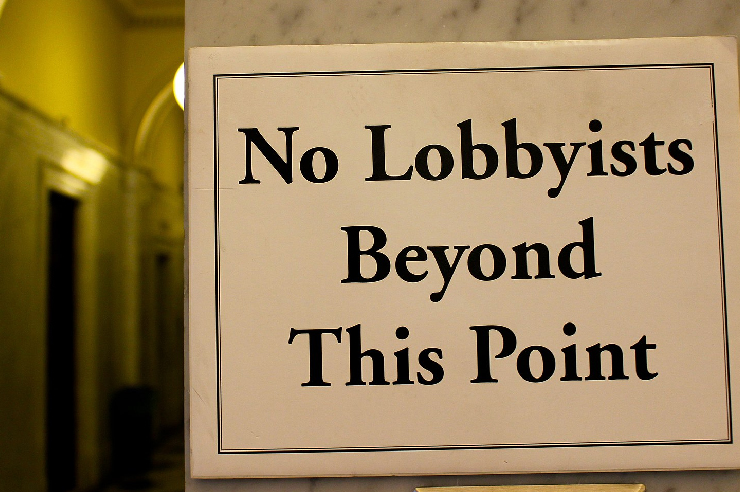The Republicans’ plan for control of the Senate makes business lobbyists giddy — but it should make you outraged.
Published on Indymedia.
With races throughout the country coming down to the wire, who will control Congress after next week’s elections appears less certain than ever. This much, however, is clear: If Republicans succeed in taking over the Senate and retaining their majority in the House, they are prepared to use their dominance to pursue an agenda of corporate giveaways and favors for the rich.
Last week the Washington Post reported that Republicans have already mapped out a plan for how to use their new power. And according to Michael G. Franc of the Heritage Foundation, the mood amongst business lobbyists and economic conservatives is “guarded optimism, bordering on giddiness.”
You can be sure that any agenda that makes these purveyors of special interest titter with delight will be disastrous for ordinary Americans. But few people truly appreciate why a plan to promote “tax relief,” “tort reform,” and a prescription drug “proposal” qualifies as a national disgrace.
At the top of their list, Republicans are looking to deepen tax cuts for the wealthy by condensing the ten-year payment plan passed in 2001 into a five-year giving spree. A recent report by Citizens for Tax Justice (CTJ) indicates that when fully implemented, 52 percent of the total tax cuts will go to the richest one percent of Americans.
Currently, individuals making over $1.5 million a year stand to receive $234 billion in Bush tax breaks in 2010. While this exclusive brotherhood would no doubt enjoy getting its payoffs early, “speeding up” tax cuts does few favors for the vast majority of citizens, whose tax savings already went into effect. As the CTJ study explains, “freezing the Bush tax cuts at their 2002 levels would have little or no effect on 99 percent of the taxpayers.”
The Republican plan for “tort reform”—limitations on the amount of money that can be collected in civil lawsuits—is a similar kind of Trojan horse: A giveaway to big insurance companies posing as a source of consumer savings and an antidote to frivolous lawsuits. As Texas Governor, Bush championed sweeping legislative restrictions on punitive damages and corporate liability. But when the Center for Economic Justice on Tort Reform reviewed the results, it found that these “reforms” did little to reduce the insurance bills that people got in the mail. Tort legislation did, however, succeed in generating windfall profits for Texas automobile insurers—to the tune of $3 billion over two years.
Maybe that explains why insurance and tort lobby groups contributed over $4 million to Bush’s two gubernatorial campaigns. And why they poured $5.7 million in soft money into GOP coffers in 2001 alone.
Ralph Nader’s decades of service as a consumer advocate taught him that the lawsuits discouraged by tort “reforms” in fact serve a crucial civic function. In a world where lobbyists toast regulators over dinner, and busy paper-shredders hide business practices that endanger public safety, the courtroom is “often the only place where an individual can effectively challenge raw corporate and financial power,” Nader argues.
You might think that President Bush’s recently announced prescription drug plan is an example of the “compassionate” finally beating out the “conservative.” But you’d be wrong. According to the Washington Post, White House officials made little effort to hide the crass politicking behind the decision to change their stance against helping seniors buy affordable, generic drugs. The new position, the officials said, “would rob Democrats of a potent issue and help the President in Florida in 2004.”
The Bush plan pales in comparison to stronger Senate legislation on the same issue, which the President and most of his fellow Republicans steadfastly opposed. Among its weaknesses, the Administration’s plan does nothing to break the major drug companies’ habit of paying their rivals to keep them from ever bringing cheap generic drugs to market. Moreover, since Bush padded his proposal with a “60-day comment period,” there is reason to believe that his tough stance on prescription drugs will get a whole lot weaker after the elections have passed and the pharmaceutical giants offer their “comments.” Rep. Sherrod Brown of Ohio said that the Bush plan is “an insult to American consumers.”
Highlighting this offensive set of policy priorities does not require buying into the Democratic National Committee’s idea that its party has crafted a brilliant plan for assisting working people and stimulating the economy. The Democrats have squandered the opportunity to rally popular outrage about corporate scandal. And this year’s genuflecting to Bush’s war machine is only the most recent example of how the opposition party has been bulldozed by the partisan-in-Chief.
Nevertheless, a Democratic Senate remains one of the few institutional barriers keeping the Republicans’ “Full Control” fantasies in check. And after Election Day, Democrats consistently prove more susceptible to public pressure from Americans organizing for tax justice, living wage jobs, corporate accountability, and truly affordable health care.
Of course, it is the prospect of this alternative agenda, coming from below, that can rob the business lobbyists of their premature giddiness.
__________
Research assistance for this article provided by Katie Griffiths. Photo credit: Daniel Huizinga / Wikimedia Commons.
